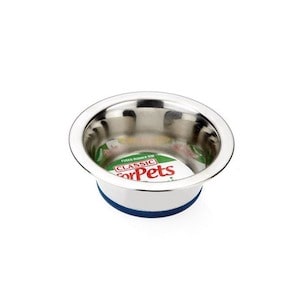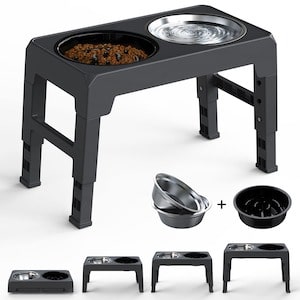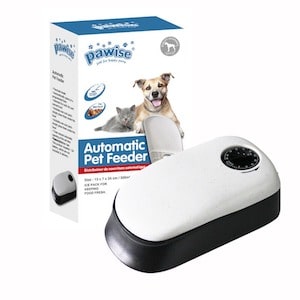It’s pasta! Our all-time favourite dish After watching the Lady and the Tramp scene, you might also want to recreate it with your furry friend, and obviously, it will look cute, but can dogs eat pasta? That tempting look, taste, and smell of pasta always attracts us and also creates an urge to share it with our dog.
Pasta is not toxic to dogs. Definitely, you can feed your dog pasta, but under a few conditions. You can serve plain cooked pasta without any seasoning or addable, and you should also make sure your dog is not sensitive to grains or has a wheat allergy.
This kind of pasta can be a very delicious treat for your dog once in a while, but it will not provide any nutritional value. It also will not work in a daily diet. Thus, he can enjoy pasta occasionally in limited quantities. Let us discuss whether dogs can have pasta or not.
You Might Also Like:
How Is Pasta Safe For Dogs?
It is because, raw pasta is made from egg, flour(wheat), and water, which are fine with dogs up to some quantity. Pasta doesn’t contain any toxic ingredients in it as well. Without a doubt, it is not a healthy option as it neither contains any vitamins or minerals in it nor it aids in the digestive system.
“Typical human food is much too rich and fatty for a dog to properly digest” stated in Hillspet.
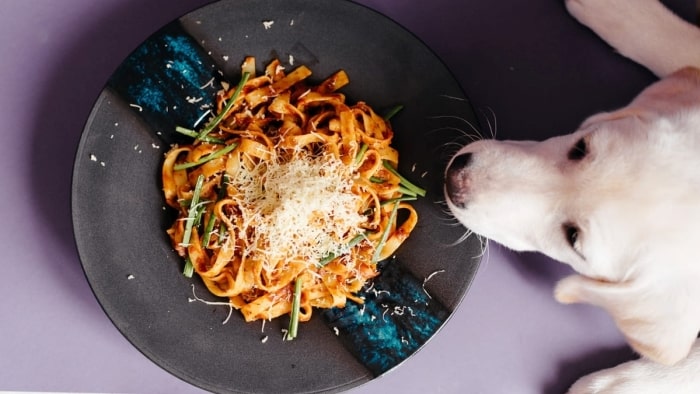
Moreover, some kinds of pasta are made from the juice of vegetables like spinach or tomato. These are considered dog-safe food. Therefore, dogs can also enjoy pasta parties occasionally as we humans do.
6 Tips for Serving Your Dog Pasta
As I mentioned before, you can feed pasta to your dog but under some conditions. Here are some tips which you should consider before serving pasta to your dog.
1) Check With Your Vet
Before you add any type of food to your dog’s diet, you should ask your vet first. Vets know which food is toxic for dogs and which food is not recommended. Vets also have a medical history of your dog through which they can also find out if your dog is allergic to wheat or grains or not.
Moreover, most pasta is made from wheat and milk, so vets can tell you whether you can feed pasta to your dog or not. This will help you and your dog to prevent medical issues.
2) Feed Pasta in Very Small Quantity
Serve pasta in very small quantities, a cup once in a while is perfect. Pasta in large amounts will disturb his stomach and it will cause stomach-related problems. Consider pasta as an occasional treat for your dog. Remember that, spaghetti and noodles are not good alternative options of pasta.
3) Keep Pasta Plain
Almost all kinds of spices and seasonings are considered toxic for dogs. Tomato sauce and seasoning are very common in pasta, make sure you do not add that. Pasta must be kept plain as any added ingredient will likely to harm your dog.
Real food is not made for dogs, therefore in order to make food tasty, do not add any ingredients. A dog’s digestive system is not made to digest table food.
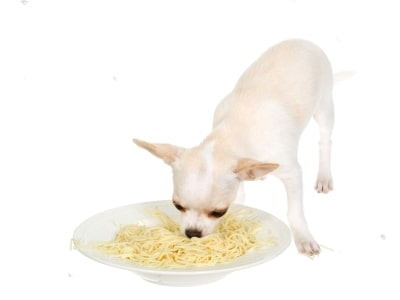
4) Dilute the Salt Content
We humans, eat nothing without salt. Even salt is not toxic for dogs as well, but too much salt can harm anyone. If you add too much salt to pasta then it can cause wreak havoc on the digestive system of dogs. If you are cooking by yourself then just do not add salt, but mostly this problem arises when you get ready-to-cook pasta which usually contains a high amount of sodium preservatives.
“Large amounts of salt can produce excessive thirst and urination, or even sodium ion poisoning in pets”. Stated in ASPCA.
5) Opt for Rice Instead
Pasta anyhow not going to harm your dog, but if you can try its healthier alternative then you should try white rice or brown rice which will soothe their stomach. If you are buying pasta from the marketplace, rather I would suggest you to try chickpea, lentil, or whole wheat pasta recipes. This will reduce the chances of gaining weight.
6) Use Cheese Sparingly
We all add cheese as a taste booster to our food. Here also, instead of serving plain pasta, add some cheese to it. Dogs love cheese, adding some cheese will make his treat super tasty. Remember to use tangy dairy products sparingly if you serve pasta. Also, make sure you do not make double-cheese pasta. A large quantity of cheese can upset his stomach and also it will contribute to fat in his body.
Want to learn more about adding herbs and spices to your dog’s diet? See our article “can dogs have mint” to find out if mint is safe and recommended for dogs.
Can My Dog Eat Spaghetti?
You will be happy to know that now dogs can eat spaghetti in the same way they can also have pasta. It should be plain here also. The sauce we use in it is very dangerous for your dog, as it contains some ingredients like garlic, salt or sugar, which can result in digestive problems.
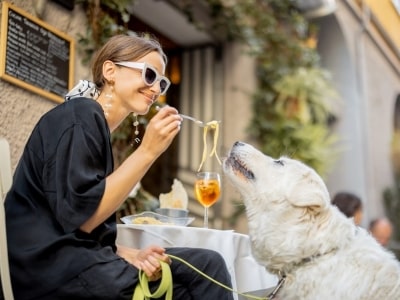
In short, you can serve spaghetti occasionally only if your spaghetti is well-cooked and plain without any other ingredients.
Interested in learning more about dogs and human food? Check out our article on “can dogs eat hash browns” to see if this beloved breakfast side is OK for your dog.
Can My Dog Eat Ramen?
Craving for hot, savoury ramen is what you needed in winter. Your pup can’t join in on the fun, unfortunately, as both traditional and instant ramen are too salty for your furry friend. Plain noodles are generally safe, but keep in mind the sodium content and flavour packets which often contain onion and garlic are not a good idea to feed your pup.
My Dog Ate Pasta – What Do I Do?
When you see your dog eating pasta without your concern, you should start by making a list of how much he ate. and what ingredients you added. If you haven’t added lots of salt and a bunch of garlic and onion, there will be not much effect on their digestive system.
Now after making a list of it, take your dog to your vet and keep that list with you. Tell everything to your vet as he needs that information in order to cure your pet.
FAQs
Can dogs eat pasta sauce?
Big no, dogs can not have tomato sauce as it may contain ingredients and additives which can harm your dog’s stomach and bring other medical problems. Not only Pasta sauces but also soups, or ketchup are also made from tomatoes and it will cause his stomach upset.
Can dogs eat cheese?
Yes, dogs can have cheese. Mostly cheese is used as a treat in dog training. Most dogs love cheese, especially puppies but some dogs are cheese intolerant.
How much pasta can a dog eat?
You should serve a very small amount of pasta to your dog. A cup of pasta twice a month is perfect and advisable. If you feed more than it, there are major chances that it will upset his stomach.
Can dogs eat Maggi instead of pasta?
Yes, you can serve maggi to your dog in a while. Maggi noodles are not toxic to your dog but it has minimal nutritional value as well. Maggi contains high fibre and fat, if you feed maggi more often than it will cause weight gain in dogs which will lead to many health problems.
Conclusion
In conclusion, the answer to the question of can dogs eats pasta is yes. While pasta is not a good source of nutrition and should not be part of a dog’s daily diet plan. Small amounts of plain, boiled pasta are safe for dogs to eat occasionally and can even provide a few nutritional benefits.
It is important to remember that you should not serve uncooked pasta or cooked with any seasonings or sauces. These can contain ingredients that are toxic to dogs and should be avoided.
All in all, pasta should never be given to dogs as a substitute for their regular food and should be fed only as a rare treat. Owners should always check with their veterinarian before feeding their dogs any kind of human food. Therefore, there is no reason why a dog cannot enjoy a small amount of plain boiled pasta as a treat on occasion.
While the occasional small serving of plain pasta is okay, dogs should never be fed salty foods like chips as a substitute. For more tips, check our article on “can dogs eat chips“
Reference:
- What should I feed my dog? (2018, November 9). Retrieved February 7, 2024, from https://kb.rspca.org.au/knowledge-base/what-should-i-feed-my-dog/
- Sharing is Caring: Foods You Can Safely Share with Your Pet. (2021, January 28). ASPCA. Retrieved February 7, 2024, from https://www.aspca.org/news/sharing-caring-foods-you-can-safely-share-your-pet
- Dog food. (2023, January 30). In Wikipedia. https://en.wikipedia.org/wiki/Dog_food
